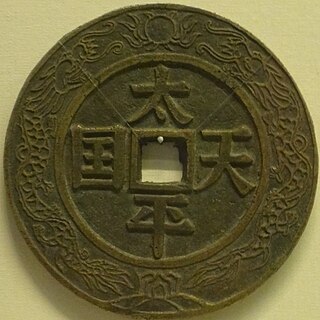 W
WThe Taiping Rebellion, which is also known as the Taiping Civil War or the Taiping Revolution, was a massive rebellion or civil war that was waged in China from 1850 to 1864 between the established Qing dynasty and the theocratic Taiping Heavenly Kingdom.
 W
WThe Ever Victorious Army was the name given to a small imperial army that fought rebels in late-19th-century China. It was directed and trained by Europeans. The Ever Victorious Army fought for the Qing Dynasty against the rebels of the Nian and Taiping Rebellions.
 W
WHong Xiuquan, born Hong Huoxiu and with the courtesy name Renkun, was a Hakka Chinese revolutionary who was the leader of the Taiping Rebellion against the Qing Dynasty. He established the Taiping Heavenly Kingdom over varying portions of southern China, with himself as the "Heavenly King" and self-proclaimed younger brother of Jesus Christ.
 W
WThe Red Turban Rebellion of 1854–1856 was a rebellion by members of the Tiandihui or Heaven and Earth Society (天地會) in the Guangdong province of South China.
 W
WThe currency of the Taiping Heavenly Kingdom consisted of Chinese cash coins and paper money, although the rarity of surviving Taiping paper money suggests that not much was produced. The first cash coins of the Taiping Heavenly Kingdom were issued in the year 1853 in the capital of Tianjing. The cash coins of the Taiping Heavenly Kingdom should not be confused with the Taiping Tongbao (太平通寳) which was issued during the Northern Song dynasty between the years 976 and 997, or with any other contemporary rebel coinage that also bear this inscription.
 W
WThe Taiping Heavenly Kingdom, later shortened to Heavenly Kingdom or Heavenly Dynasty, was an unrecognized oppositional state in China and Christian-Shenic theocratic absolute monarchy from 1851 to 1864, supporting the overthrow of the Qing dynasty by Hong Xiuquan and his followers. The unsuccessful war it waged against the Qing is known as the Taiping Rebellion. Its capital was at Tianjing.
 W
WThe wall gun or wall piece was a type of smoothbore firearm used in the 16th through 18th centuries by defending forces to break the advance of enemy troops. Essentially, it was a scaled-up version of the army's standard infantry musket, operating under the same principles, but with a bore of up to one-inch (25.4 mm) calibre. These weapons filled a gap in firepower between the musket and the lightest artillery pieces, such as the swivel gun. This sort of weapon may also be found described as an amusette, rampart gun or Hackbut, a name originally given to early medieval hand cannon.
 W
WThe Xiang Army or Hunan Army was a standing army organized by Zeng Guofan from existing regional and village militia forces called tuanlian to contain the Taiping Rebellion in Qing China. The name is taken from the Hunan region where the Army was raised. The Army was financed through local nobles and gentry, as opposed to through the centralized Manchu-led Qing dynasty. The army was mostly disbanded by Zeng after the re-capture of the Taiping capital at Nanking.